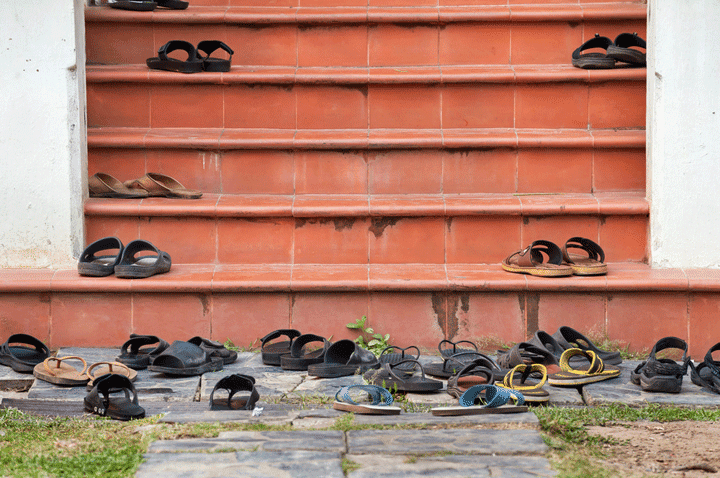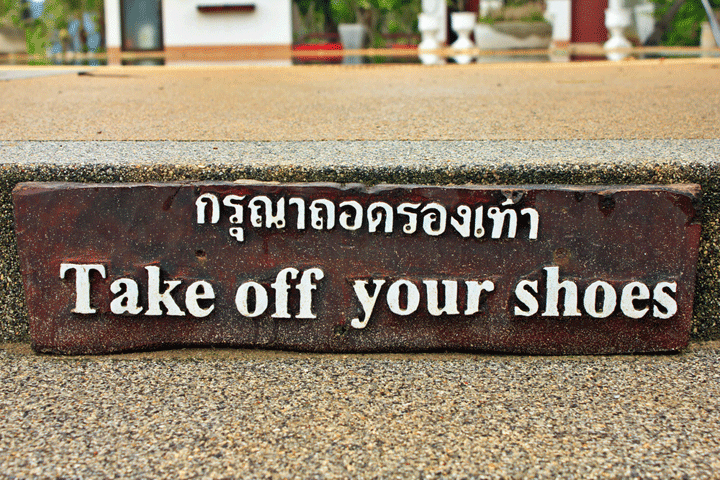Thailand: Shoes off, please!
In Thailand, there are several 'do's and don'ts'. In many cases, minor missteps by a tourist will be forgiven. But Thai people really appreciate it when you show respect for local traditions and customs.
One of the ways you can do that is to take off your shoes before entering certain buildings.
Temple visit
As a tourist you will almost certainly visit a temple (Wat) in Thailand. These Buddhist shrines are beautiful to see and freely accessible to everyone. When visiting a temple, it is always expected that you take off your shoes. This does not apply to the entire temple grounds. If you see a number of shoes somewhere, that is also the place from where you have to walk without shoes. Just watch how the Thai do it.
At the Thai home
When you visit a Thai family, rich or poor, you have to take off your shoes when entering the house. Failure to do so could be construed as disrespectful behavior towards the host.
Stores
Usually it is not necessary to take off your shoes when entering a store. However, if you see a lot of footwear outside, it is desirable. Some internet cafes, smaller shops and boutiques still use this rule.
Don't stand on the threshold
Finally, we have the threshold. If you are visiting a house or building with a threshold, it is polite to step over it and not get up. The reason for this is the belief among Thais that ghosts haunt houses and buildings. The threshold is an abode of spirits. If you step on it, you would disturb the spirit and possibly anger it. That could result in bad luck and misfortune for the family living there.
– Reposted message –




In my parents' house we also took off our shoes in the hall, and some of our friends did too. My shoes come off at my house too. Some guests do, others prefer to leave them out. Mai pen rai, no problem. Also with many people where I come across the floor, the shoes just take off. I don't mind taking off shoes at all.
I know the story of not standing on the thresholds, of course. So I don't do that at a temple, for example. But I caught my tarak standing on thresholds (temples and houses) several times. If I asked if that was allowed, no problem. And those ghosts? Yes, there are, but they are not in the threshold, she said. I had to laugh about that, that as a farang I tried to apply rules from the well-known books and my Thai contacts (girlfriend, family, friends) violated many of those rules. No, not because I deal with rude people, I think more because some of those rules are just very outdated and it will just vary by region or social class and personality.
The best thing is just to copy the behavior of what you see others doing, unless you really have a hard time with that yourself. Conversely, we also expect this from foreign people in our country, or at least appreciate it very much. Below the line, the golden mean can often be found, then most are happy. 🙂
I think it's perfectly normal for you to follow the host's rules. Just out of respect. No one comes in with shoes. That was already the case in Europe.
I also find that a bit strange because the Thai often walk barefoot, which are very dirty and then you can walk into the house, but oh woe if you put on clean shoes in the house, it is completely wrong. I have bath slippers on in the house and they also stay in the house to wash every day because they also get dirty from the dust that blows in. And some people's feet are dirtier than my shoe soles.
One person adapts easily, the other does not understand it and does not seem to make an effort to understand the other culture. That difference between people has to do with cultural sensitivity and you get that from home or you don't. How were you raised? And were other cultures spoken of with respect at home? Your character also influences the extent to which you are open to other cultures. Someone who adapts easily everywhere travels the globe without effort, and with endless pleasure.
Don't be rigid and don't cling to your own norms, customs and values. What is normal in our country may not be so elsewhere. We think it's normal to pet a dog, not to eat it. Our own learned behavior is the yardstick by which we measure other cultures. But in other cultures, completely different rules apply to normal and abnormal. To understand other cultures we have to let go of strict norms. Realize that our view of normal and abnormal is purely Dutch. Observe other cultures with an open mind, which means: don't judge and be open to different.
“We view the world through a Dutch, red-white-blue lens. What is normal? What does someone else consider normal? Those glasses reflect deep-seated beliefs about what is appropriate and what is not. Because we look through that cultural lens, we are confronted with behavior abroad that is sometimes incomprehensible. We don't think Americans eat with just a fork. And we certainly don't know what to do with the belching and gurgling fellow human beings in China. To quickly adapt to another culture, you must be willing to push your limits. Take off your glasses and immerse yourself in the habits and customs of the residents in your holiday country. Try to understand the culture.
Adapting to another culture starts with deepening. Read about it, ask about it, get to know the history and backgrounds. You don't have to like and like everything, but condemning is misplaced.
Klompe Buuten standing late
That's how I was raised…..also in Brabant
You have to show respect when you are in another country, you achieve more and they treat you well. You show yourself in their doings and that's what you get back. They do this for years from children to grandchildren this is about. I have no problem with that.. Because if they see that you accept their faith and value and respect them in their doings, then you as a falang are better valued and respected.
We in the Netherlands can learn a lot from their respect..such as respect towards parents and grandparents.
Keep it up.. You get where I want to go..
I only take off my shoes in very exceptional cases, of course in Temples and with foot massage, with oil massage I even take everything off.
I have/had never heard of that threshold, not even my Thai wife. When I enter a temple I take off my shoes. Put on cheap slippers in advance, you never know if you will find (expensive) slippers. There are shops (shops?) that have a new tile floor and then require you to take off your shoes. I don't and certainly not when visiting a restaurant. It shouldn't get crazier than it already is here.
Brabant is not Thailand ...... And at a temple in Thailand there is no mat in front of the door. Some respect for the manners and customs in the country where you are a GUEST is in order.
Incidentally, at my home in the Netherlands I also appreciate it when visitors take off their shoes, I have white (yes….. white) carpeting in the living room and I like to keep it clean. Have (disposable) slippers available for everyone who comes to me.
Exactly my idea.
If you don't want to take off your shoes, you can't come in with us, medical reasons aside.
Often the response. My shoes are not dirty.
The street is really never clean.
In addition, it is also disrespect towards your host/friend.
In inland shipping it is quite normal to take off your shoes upon entering.
We also have later in the house, always shoes off.
When we were kids we always had to take off our shoes in the hall. There were also slippers in the hall for visitors. If you didn't take your shoes off you couldn't get past the hall. No one entered the living room with shoes on. Our mother was the boss in her house.!!